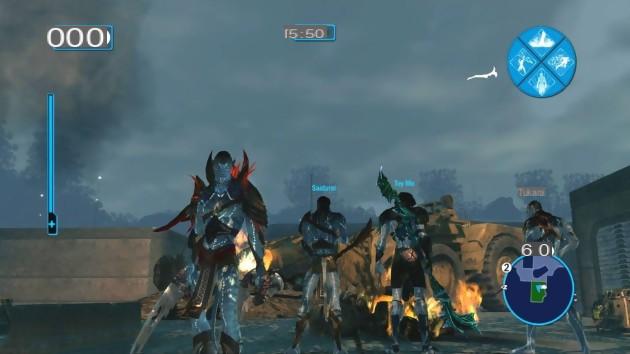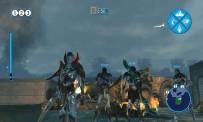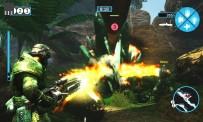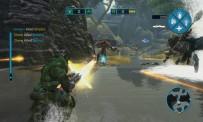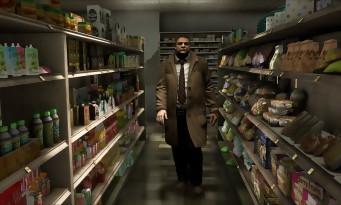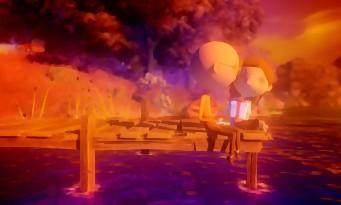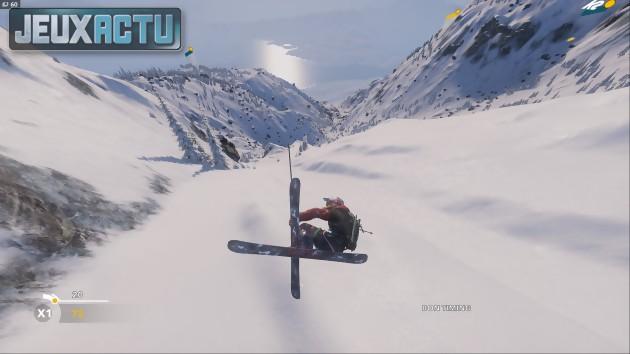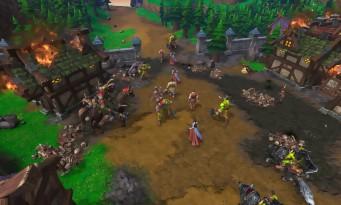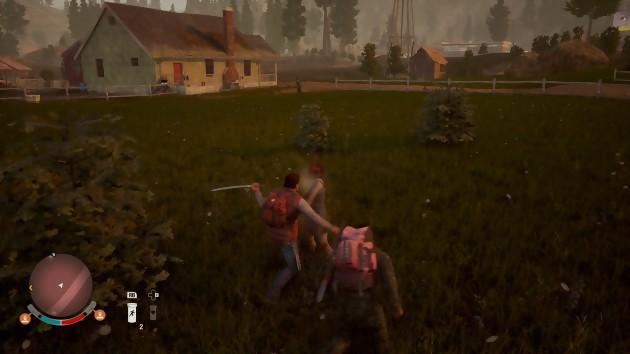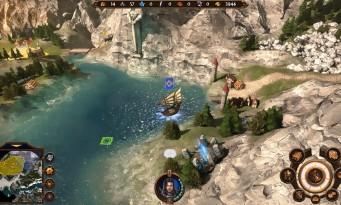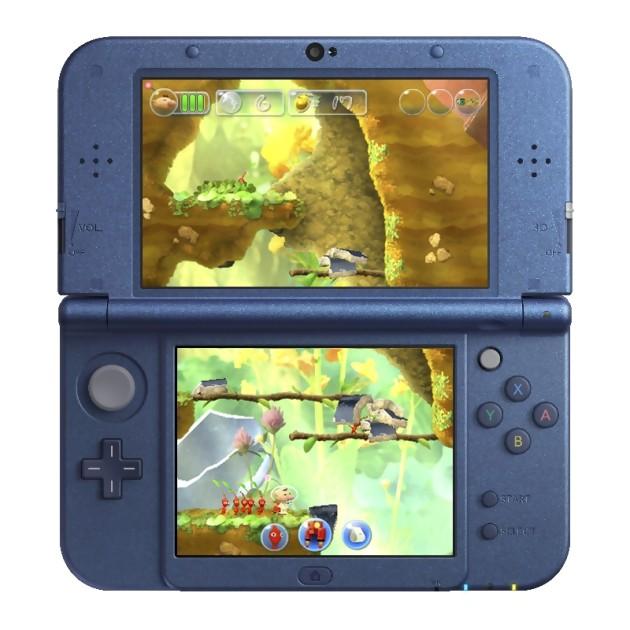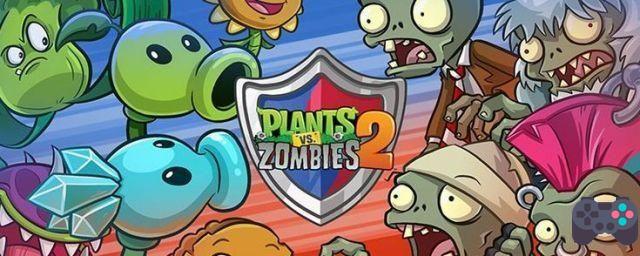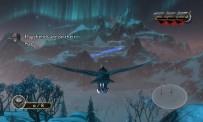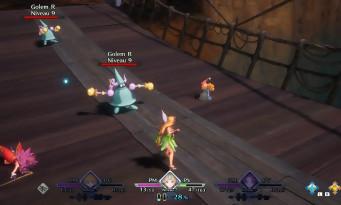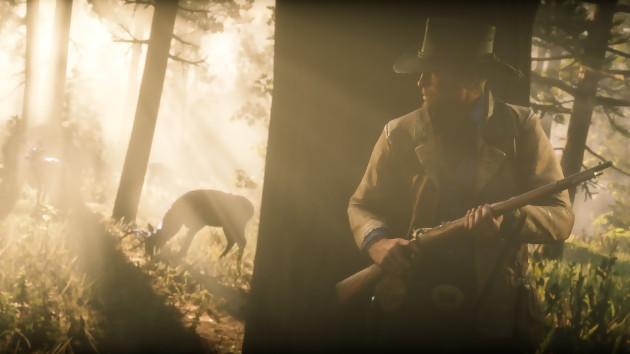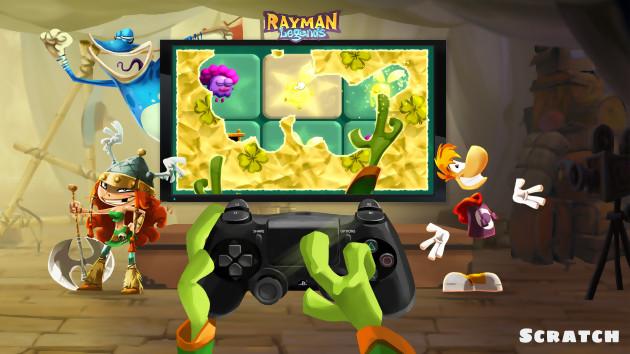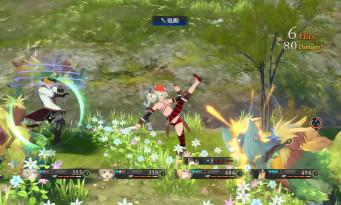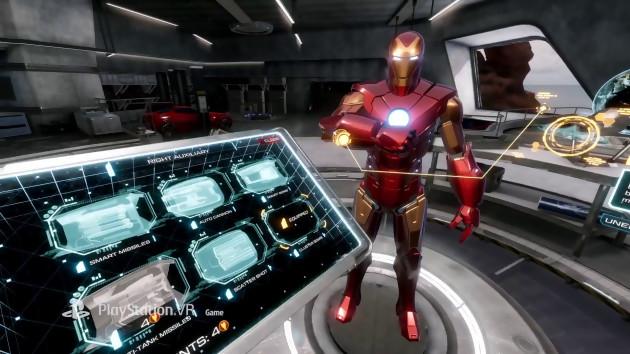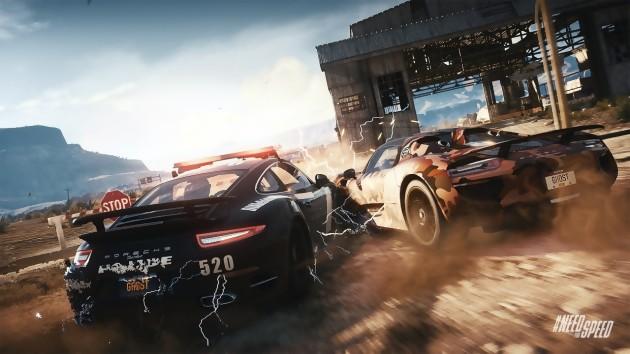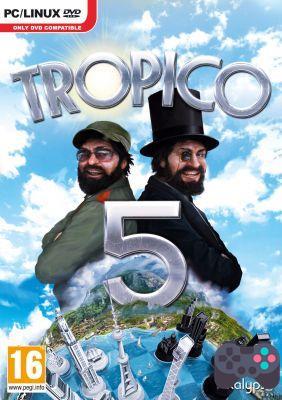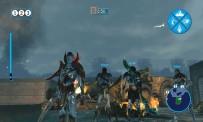 Pandora, a mysterious and green planet, attracts the greed of a horrible mega-corporation of the future. To achieve its ends – to obtain power, money, women, others – the said conglomerate is ready to do anything, including passing the local population, the Na'vis, to the sulphate of tomorrow. Giant blue-skinned humanoids, pacifists and living in communion with the exuberant nature that surrounds them, this tribe of good savages refuses, curiously enough, to see their world devastated by greed and tries to oppose the imperialist aims of our descendants. To put down the rebellion, humanity relies on a powerful weapon, avatars, which allow men and women to take remote control of a biological envelope created for them and adapted to the contingencies of the terrain. And what body more appropriate than that of a Na'vi? Freshly landed on site, you begin your career as a shock marine, heavy weapons and access to human gadgets included, but will quickly have the opportunity to slip into a more attractive skin in the eyes of the natives. After a big half-hour of play, you will nevertheless have to make a choice: continue your work of destruction in your small, frail body but with your big weapons, or continue your journey as a Na'vi... and alongside the Na’vis.
Pandora, a mysterious and green planet, attracts the greed of a horrible mega-corporation of the future. To achieve its ends – to obtain power, money, women, others – the said conglomerate is ready to do anything, including passing the local population, the Na'vis, to the sulphate of tomorrow. Giant blue-skinned humanoids, pacifists and living in communion with the exuberant nature that surrounds them, this tribe of good savages refuses, curiously enough, to see their world devastated by greed and tries to oppose the imperialist aims of our descendants. To put down the rebellion, humanity relies on a powerful weapon, avatars, which allow men and women to take remote control of a biological envelope created for them and adapted to the contingencies of the terrain. And what body more appropriate than that of a Na'vi? Freshly landed on site, you begin your career as a shock marine, heavy weapons and access to human gadgets included, but will quickly have the opportunity to slip into a more attractive skin in the eyes of the natives. After a big half-hour of play, you will nevertheless have to make a choice: continue your work of destruction in your small, frail body but with your big weapons, or continue your journey as a Na'vi... and alongside the Na’vis.
Le grand bleu
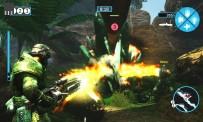 Let's summarize: after several years of hypersleep, a well-trained soldier is able to realize in less than half an hour that his employer is downright mean and that it is therefore his duty to deny his race and kick all his colleagues. fighting out of a world he doesn't know. At least you're warned early: James Cameron's Avatar: The Game is built on a shaky storyline. Between crappy twists, miserable dialogues and esoteric-ecological delusions unworthy of a schoolgirl in the midst of a mystical crisis, the plot does not hold water for a second. However, it takes a little longer to realize how the gameplay is to match. Action-exploration game eyeing the side of Lost Planet, the work of Ubisoft Montreal invites you to explore vast natural levels the weapon in hand, and to atomize everything that comes your way by carrying out quests given by NPCs without charisma. The idea is not unpleasant, especially since Pandora offers a fairly spectacular playground. Although built as networks of corridors, the different maps do indeed honor the luxuriance that Cameron wanted, and some areas are particularly spectacular. Steep cliffs, colorful fauna, elegant flora, all this lacks a bit of variety but if you dream of visiting delirious tropical forests at a lower cost, you will be satisfied. Alas, on Pandora as elsewhere, a jungle remains a jungle, namely a landscape in which it is difficult to distinguish anything. You will therefore have to be extremely attentive to spot your enemies before they see you, especially if you are playing in the Na'vi camp.
Let's summarize: after several years of hypersleep, a well-trained soldier is able to realize in less than half an hour that his employer is downright mean and that it is therefore his duty to deny his race and kick all his colleagues. fighting out of a world he doesn't know. At least you're warned early: James Cameron's Avatar: The Game is built on a shaky storyline. Between crappy twists, miserable dialogues and esoteric-ecological delusions unworthy of a schoolgirl in the midst of a mystical crisis, the plot does not hold water for a second. However, it takes a little longer to realize how the gameplay is to match. Action-exploration game eyeing the side of Lost Planet, the work of Ubisoft Montreal invites you to explore vast natural levels the weapon in hand, and to atomize everything that comes your way by carrying out quests given by NPCs without charisma. The idea is not unpleasant, especially since Pandora offers a fairly spectacular playground. Although built as networks of corridors, the different maps do indeed honor the luxuriance that Cameron wanted, and some areas are particularly spectacular. Steep cliffs, colorful fauna, elegant flora, all this lacks a bit of variety but if you dream of visiting delirious tropical forests at a lower cost, you will be satisfied. Alas, on Pandora as elsewhere, a jungle remains a jungle, namely a landscape in which it is difficult to distinguish anything. You will therefore have to be extremely attentive to spot your enemies before they see you, especially if you are playing in the Na'vi camp.
Much ado for nothing
 Embodying a three-meter-tall hero tracking little green camouflage men is indeed a relatively unusual task, and one often seeks to distinguish an opponent at eye level where it would be necessary to look a little more towards the ground. The best way out is still to wait to get shot, and track the bullets. Even so, it is not always easy to find your assailant as the camera struggles to follow the action and adopts totally unsuitable angles. When you manage to identify your target, you still have to manage to hit it. A specialist in bladed weapons, the Na'vis lose in melee performance due to poor collision management. Ranged assaults are, paradoxically, a bit more precise but lack just as much impact as frontal attacks. Despite the overall hyper aggressive design of the arsenal (sharp double blades, a club with spikes and other fun things for the Na'vis, a nice collection of firecrackers, from the shotgun to the flamethrower for our congeners), all of this is sorely lacking in bite and the sluggishness of the fights will make action game fans cry with shame. The game also suffers from constant drops in pace, and you sometimes have to walk for a long time before crossing paths with a small group of opponents to pulverize. To speed up the movement, you can sometimes borrow vehicles – live from the Blues, mechanical from the Men – but their handling is imprecise and painful enough for you to prefer to continue your quests on foot. And what quests! If you think you're having an epic and exhilarating adventure on Pandora, you're seriously mistaken. Here, you will more often play the postman or the florist than the savior of the world and, worse, will constantly have the feeling of your uselessness. From the first to the last level, you will do more or less the same thing, but you will do it each time with a little less enthusiasm unless, after five hours of adventure, you are tired of going "to carry a message to such and such a ", you simply turned off the console. Ubisoft Montreal has tried to vary its product a bit, by including two distinct campaigns, vehicles, but also by allowing you to use special abilities - not very interesting and which sometimes fail due to collision concerns - or even damage. try a Conquest mode. This little sequence, which you can access as soon as you find a teleporter, allows you to move troops on a Pandora map, like a Risk. The interest of the thing is close to nothing, especially since the impact of your conquests in the game is negligible. The few multiplayer modes, hardly more exciting, complete the ruin of this adventure of a sinister platitude.
Embodying a three-meter-tall hero tracking little green camouflage men is indeed a relatively unusual task, and one often seeks to distinguish an opponent at eye level where it would be necessary to look a little more towards the ground. The best way out is still to wait to get shot, and track the bullets. Even so, it is not always easy to find your assailant as the camera struggles to follow the action and adopts totally unsuitable angles. When you manage to identify your target, you still have to manage to hit it. A specialist in bladed weapons, the Na'vis lose in melee performance due to poor collision management. Ranged assaults are, paradoxically, a bit more precise but lack just as much impact as frontal attacks. Despite the overall hyper aggressive design of the arsenal (sharp double blades, a club with spikes and other fun things for the Na'vis, a nice collection of firecrackers, from the shotgun to the flamethrower for our congeners), all of this is sorely lacking in bite and the sluggishness of the fights will make action game fans cry with shame. The game also suffers from constant drops in pace, and you sometimes have to walk for a long time before crossing paths with a small group of opponents to pulverize. To speed up the movement, you can sometimes borrow vehicles – live from the Blues, mechanical from the Men – but their handling is imprecise and painful enough for you to prefer to continue your quests on foot. And what quests! If you think you're having an epic and exhilarating adventure on Pandora, you're seriously mistaken. Here, you will more often play the postman or the florist than the savior of the world and, worse, will constantly have the feeling of your uselessness. From the first to the last level, you will do more or less the same thing, but you will do it each time with a little less enthusiasm unless, after five hours of adventure, you are tired of going "to carry a message to such and such a ", you simply turned off the console. Ubisoft Montreal has tried to vary its product a bit, by including two distinct campaigns, vehicles, but also by allowing you to use special abilities - not very interesting and which sometimes fail due to collision concerns - or even damage. try a Conquest mode. This little sequence, which you can access as soon as you find a teleporter, allows you to move troops on a Pandora map, like a Risk. The interest of the thing is close to nothing, especially since the impact of your conquests in the game is negligible. The few multiplayer modes, hardly more exciting, complete the ruin of this adventure of a sinister platitude.
